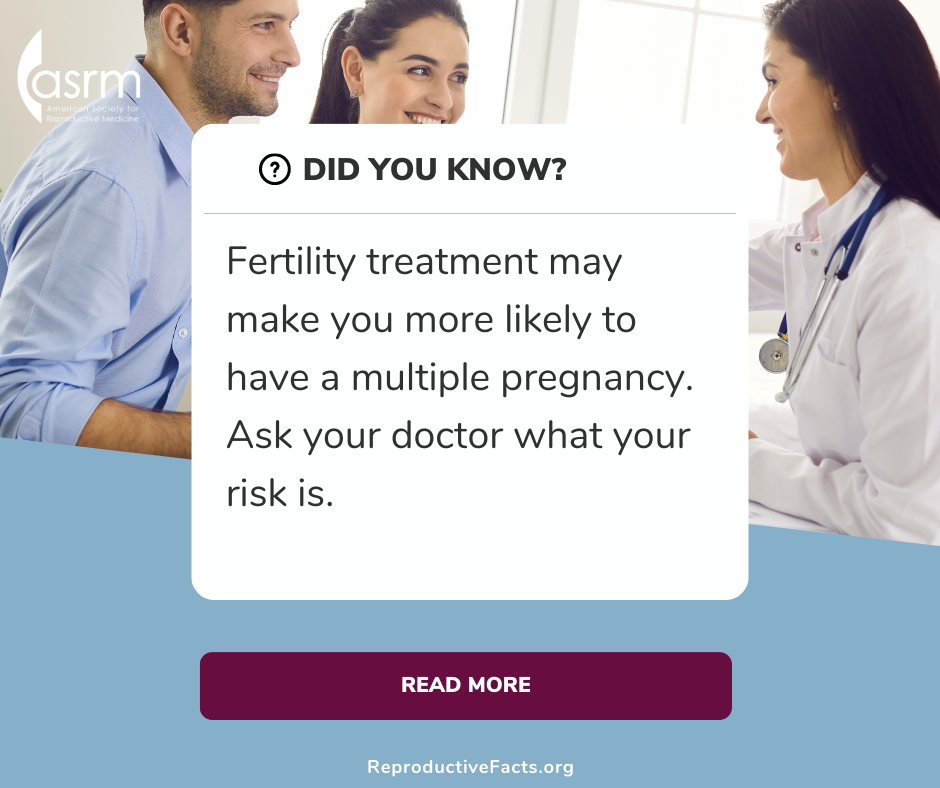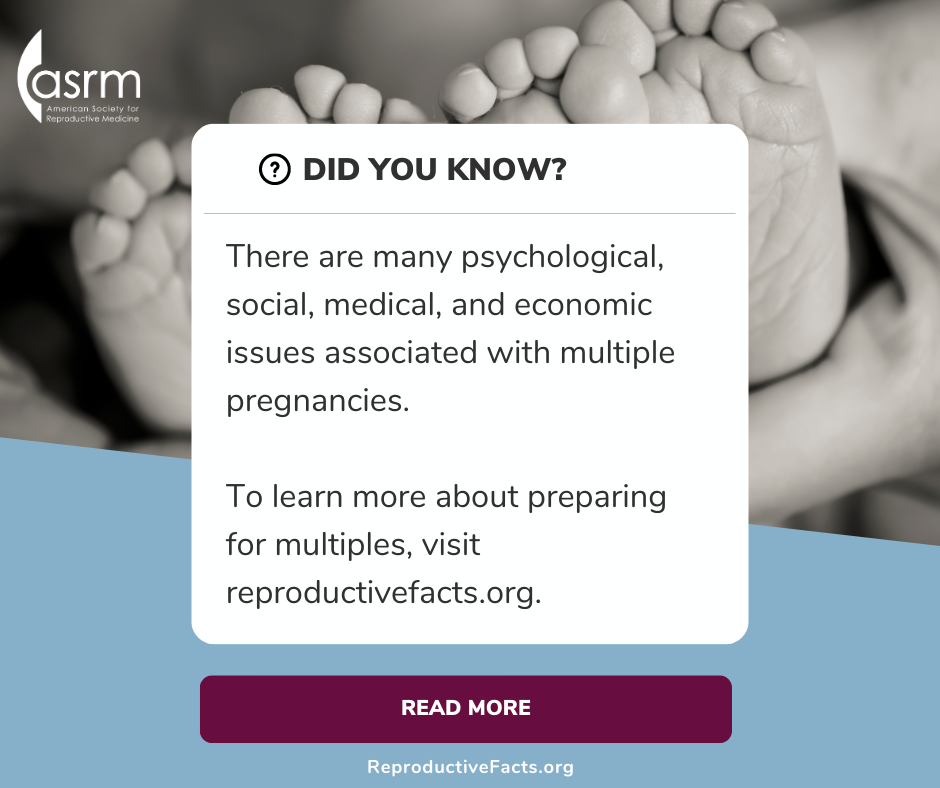
CHALLENGES OF PARENTING MULTIPLES
Revised 2023
 There are many psychological, social, and economic issues associated with multiple pregnancies. These issues should be given the same attention as the medical risks. Fertility treatment might make you more likely to have a multiple pregnancy. If you are currently pregnant with multiples (more than one baby), the issues discussed in this fact sheet will help you make informed decisions about your treatment. It will also prepare you for the unique challenges and rewards of parenting multiples.
There are many psychological, social, and economic issues associated with multiple pregnancies. These issues should be given the same attention as the medical risks. Fertility treatment might make you more likely to have a multiple pregnancy. If you are currently pregnant with multiples (more than one baby), the issues discussed in this fact sheet will help you make informed decisions about your treatment. It will also prepare you for the unique challenges and rewards of parenting multiples.
Psychological And Social Issues
Some multiples, especially newborns, may be hard to tell apart even if they are not identical. At first, you can tell multiples apart by color-coding their clothing or using bracelets that spell out their names. Soon, you will be able to tell them apart by their individual characteristics and personalities.
Parents may bond with multiples differently than single-born children (singletons). During the first weeks, you may prefer one infant more than the others. Your “favorite” may vary weekly as you get to know each one. Each infant will have different needs at different times, requiring differing amounts of attention.
It is physically harder to take care of multiples than singletons. This is especially true when they are infants and toddlers. It may make the parents feel tired and stressed a lot of the time. Make sure to take some time for yourself and your partner as a couple, even if only for a few minutes a day. Remember to take care of yourself as well as your children.
 Older siblings may have a hard time getting used to the new babies. They will need you to pay attention to them too. Try to be sensitive to the needs of your older children. Involve them in the pregnancy by taking them with you to doctor visits. Ask them to help choose items for the nursery. Ask them to be your “helper” and ask for their opinions on taking care of the babies. This will help them feel needed and loved. Young children will need consistent one-on-one time with you, even if it is in short blocks.
Older siblings may have a hard time getting used to the new babies. They will need you to pay attention to them too. Try to be sensitive to the needs of your older children. Involve them in the pregnancy by taking them with you to doctor visits. Ask them to help choose items for the nursery. Ask them to be your “helper” and ask for their opinions on taking care of the babies. This will help them feel needed and loved. Young children will need consistent one-on-one time with you, even if it is in short blocks.
Some parents and schools prefer that multiples be in separate classes. This may help promote individuality. This is true, particularly if the children have different abilities. However, some schools may not have enough classes to separate multiples, and sending the children to different schools may not be possible. Contact your local school system to ask about their policies on separating multiples. You can also work with your children’s teachers to provide the best environment for your children.
Parents of multiples may feel socially isolated. They may be tired, not have enough personal time, are too busy taking care of the children, or are having money troubles. It is easy to become completely consumed in caring for multiples, but don’t abandon all of your hobbies and interests. Instead, look for ways to creatively balance your needs with those of your children.
Multiples often attract attention. People may ask if you went through fertility treatment. This may have positive or negative consequences depending on the personalities of the parents and children and the nature of the attention. Plan ahead on how you will respond to this kind of attention and questions. Keeping a sense of humor is important.
Help from family and friends is often short-term. Parents of multiples usually need additional help, even if one parent stays at home. Premature infants require smaller, more frequent feedings than full-term infants. It also requires a lot of time to feed them at night and change their diapers. You might need someone to help you at night until the babies have reasonable sleeping habits. If you can’t have someone in your home to help, work out a schedule so that each parent shares the work equally. Lack of sleep may cause fatigue and depression. Be aware of these signs in yourself or your partner. You should work as a team to overcome these difficulties.
It might help to find support from organizations that are familiar with multiple births. Networking with parents who have had multiple births can also be helpful during difficult times.
 Economic Issues
Economic Issues
- The cost of delivering multiples versus a singleton birth can vary widely based on factors such as location, the type of delivery, any complications, and the duration of hospital stay. Generally, delivering twins is more expensive than a singleton birth due to the increased medical attention and potential for complications. Check your medical insurance to determine your out-of-pocket costs, if any, and plan ahead.
- The total cost of raising multiples is likely higher than the cost of raising the same number of singletons. Cribs, car seats, high chairs, and other items must be bought all at once, which can be financially difficult. Most multiple birth support groups have garage sales where families can buy clothing and equipment for multiples at low cost.
A Final Thought
Caring for multiples can be a challenge, but it can also be rewarding. Try to join a support group and spend time with other parents of multiples to learn from their experiences. Ask your doctor about local and national support groups. Look for community resources in your area. The more information you have, the better prepared you will be.
Fact Sheets/Booklets
View more fact sheets and booklets written by the ASRM Patient Education Committee.
Menopausal Transition (Perimenopause): What Is It?
The menopausal transition (perimenopause) is the period that links a woman’s reproductive (childbearing) years and menopause.
Osteoporosis
Osteoporosis and osteopenia are conditions of having low bone mass (density).
Hyperprolactinemia (High Prolactin Levels)
Prolactin is a hormone produced by your pituitary gland which sits at the bottom of the brain.Multiple Births or Multiple Gestation
Find a Health Professional











